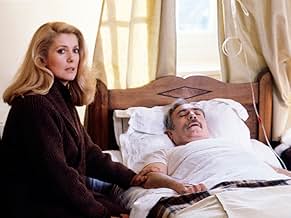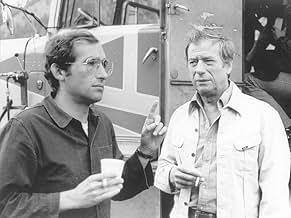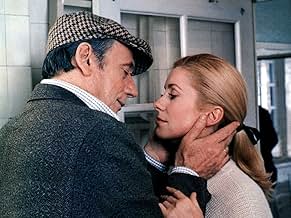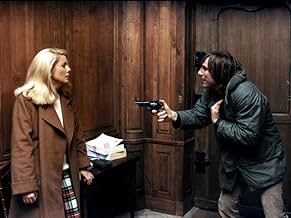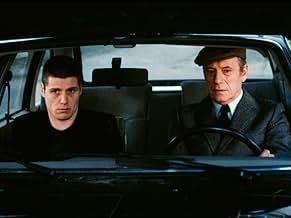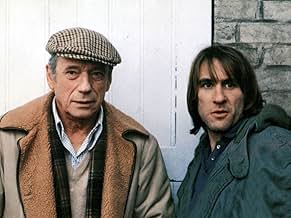IMDb रेटिंग
6.9/10
2.2 हज़ार
आपकी रेटिंग
अपनी भाषा में प्लॉट जोड़ेंThe powerful story of a reformed underworld kingpin whose stable lifestyle is turned upside-down when a desperate, escaped killer hides out at his rural estate.The powerful story of a reformed underworld kingpin whose stable lifestyle is turned upside-down when a desperate, escaped killer hides out at his rural estate.The powerful story of a reformed underworld kingpin whose stable lifestyle is turned upside-down when a desperate, escaped killer hides out at his rural estate.
- निर्देशक
- लेखक
- स्टार
फ़ीचर्ड समीक्षाएं
.. of superlatives. This, the last of the three polars that Corneau made top-billing Montand, finds Montand retired from the mob and roughing it with Catherine Deneuve in a large country chateau where they breed thoroughbreds. Such an idyll can't last, natch, so, before you can say 'make my day, punk', enter Depardieu, hothead extaordinaire, on the lam and looking for a soft touch. Eventually we need the obligatory scene in which the ageing gunfighter dusts off the old six-shooter and wastes the wannabee new fastest gun, except, of course, that this isn't a Western but a very sophisticated and hugely enjoyable polar.It doesn't get any better than Montand and Depardieu (who had worked together earlier in Claude Sautet's 'Vincent, Paul, Francois et les autres' and would do so again in 'Jean de Florette') and with Corneau on bullhorn what's not to like. Post-war French policiers/polars are in a class of their own and provided your nose is in good working order the whiff of cordite can be identified at once as generated by Jean Pierre Melville, Alain Corneau, Tavernier, etc. This one is right out of the top drawer and would BE a top drawer on any screen it graced. Go see! Enjoy!
"Le choix des armes" is a good example of French movie thriller -"le polar à la française", we can define it a true cinematic genre.
The film is an encounter between two generations of gangsters. The older one (Montand) lives now a quite life with his wife (Deneuve), the younger (Depardieu) has just escaped from prison. In this story both live personal dramas: Montand's brother dies during his escape and Deneuve is erroneously killed during a police operation; Depardieu face the impossibility of going elsewhere with his daughter and leading a normal life. He will pay the price of his dreams.
The direction of Alain Corneau is strong. He's able to analyze each charachter in a exhaustive way, no one is left apart. In this way also Gerard Lanvin and Michel Galabru's roles are well treated, between them there's almost the same relationship as between the two gangsters. Lanvin is a young agent who believes in justice but no one helps him, whereas Galabru is a frustrated old policeman.
Solid film, elegant, with action and many cat-and-mouse games.
The film is an encounter between two generations of gangsters. The older one (Montand) lives now a quite life with his wife (Deneuve), the younger (Depardieu) has just escaped from prison. In this story both live personal dramas: Montand's brother dies during his escape and Deneuve is erroneously killed during a police operation; Depardieu face the impossibility of going elsewhere with his daughter and leading a normal life. He will pay the price of his dreams.
The direction of Alain Corneau is strong. He's able to analyze each charachter in a exhaustive way, no one is left apart. In this way also Gerard Lanvin and Michel Galabru's roles are well treated, between them there's almost the same relationship as between the two gangsters. Lanvin is a young agent who believes in justice but no one helps him, whereas Galabru is a frustrated old policeman.
Solid film, elegant, with action and many cat-and-mouse games.
2 prison inmates, Mickey (Gérard Depardieu) and Serge escape from jail. After a trap set by other gangsters that leaves Serge badly injured, the two baddies take refuge to Noël Durieux (Yves Montand), a former gangster who leads a bourgeois life by running a stud farm. After Serge dies from his injuries, Noël has the visit of two cops Sarlat (Gérard Lanvin) and Bonnardot (Michel Galabru) who question him about Mickey and Serge and Noël affirms that he doesn't know anything about them. And things take a darker turn for because he believes Noël betrayed him, Mickey gives him a hard time. Noël has no other choice than to eliminate him.
As the heir of Jean-Pierre Melville and Claude Sautet, Alain Corneau brought to French cinema a crop of very well controlled thrillers in their writing and shooting. "Le Choix Des Armes" is part of this league and a valuable illustration of Corneau's stylish approach of French detective film. Adopting a rather sparse directing and a tight, parallel editing, the filmmaker takes pleasure in introducing the main characters and as the film progresses to deepen their personality. Like the greatest filmmakers, Corneau has his style and his set of themes. Communication is a recurrent theme in his filmography, especially the difficulties and absence of it. We learn that the cute little girl is Mickey's daughter and he had it just before he was jailed. The two cops work with different methods which doesn't make their relationships easy. Mickey and Durieux are caught in a vicious spiral that is the result of a happy misunderstanding: because Mickey thinks that Durieux gave him to the police, Durieux has to come back to his former gangster life to get rid of his protégé. As they obey to their respective emotions, the two men and especially Mickey get embroiled in a ruthless system that dwarfs them and prevents any reconciliation between them. A permanent feature (the infernal system) that affects the main characters in Corneau's previous films like in "Police Python 357" (1976) starring Yves Montand.
This somber story is painstakingly built at all levels from the organization of the scenario to the creation of the sequences. Sometimes, one shot or a few ones are sufficient to Corneau to present us the persona of a character in the film like Dany (a young Richard Anconina)'s dumb wife or the duo of cops between ambitious Sarlat and seasoned, disillusioned Bonnardot. The cast lives up to the demands of the story with Depardieu much better than Montand as impulsive, immature Mickey. Horses in Durieux's domain are an evident symbol. One could also hail scenery discerningly chosen that cement the characters' social position, either it is Noël Durieux's lascivious mansion in the country or Dany's shabby flat in popular suburbs. At that time in 1980-1, rare were the directors who dare to shoot in those high-risk outskirts.
This is excellent stuff and it's well known: it's better not to get bogged down in rut. Otherwise, you'll have nothing to say anymore. Thus, Corneau proved his ability at weaving prime thrillers. His next film, "Fort Saganne" (1984) will go in another cinematographic direction: the epic film.
As the heir of Jean-Pierre Melville and Claude Sautet, Alain Corneau brought to French cinema a crop of very well controlled thrillers in their writing and shooting. "Le Choix Des Armes" is part of this league and a valuable illustration of Corneau's stylish approach of French detective film. Adopting a rather sparse directing and a tight, parallel editing, the filmmaker takes pleasure in introducing the main characters and as the film progresses to deepen their personality. Like the greatest filmmakers, Corneau has his style and his set of themes. Communication is a recurrent theme in his filmography, especially the difficulties and absence of it. We learn that the cute little girl is Mickey's daughter and he had it just before he was jailed. The two cops work with different methods which doesn't make their relationships easy. Mickey and Durieux are caught in a vicious spiral that is the result of a happy misunderstanding: because Mickey thinks that Durieux gave him to the police, Durieux has to come back to his former gangster life to get rid of his protégé. As they obey to their respective emotions, the two men and especially Mickey get embroiled in a ruthless system that dwarfs them and prevents any reconciliation between them. A permanent feature (the infernal system) that affects the main characters in Corneau's previous films like in "Police Python 357" (1976) starring Yves Montand.
This somber story is painstakingly built at all levels from the organization of the scenario to the creation of the sequences. Sometimes, one shot or a few ones are sufficient to Corneau to present us the persona of a character in the film like Dany (a young Richard Anconina)'s dumb wife or the duo of cops between ambitious Sarlat and seasoned, disillusioned Bonnardot. The cast lives up to the demands of the story with Depardieu much better than Montand as impulsive, immature Mickey. Horses in Durieux's domain are an evident symbol. One could also hail scenery discerningly chosen that cement the characters' social position, either it is Noël Durieux's lascivious mansion in the country or Dany's shabby flat in popular suburbs. At that time in 1980-1, rare were the directors who dare to shoot in those high-risk outskirts.
This is excellent stuff and it's well known: it's better not to get bogged down in rut. Otherwise, you'll have nothing to say anymore. Thus, Corneau proved his ability at weaving prime thrillers. His next film, "Fort Saganne" (1984) will go in another cinematographic direction: the epic film.
'Choice of Arms' (the French title is 'Le choix des armes') made in 1981 is a very typical film for the genre of film noir in the French cinema of the 70s and 80s. The master of the genre was Jean-Pierre Melville who died in 1973, leaving behind only 14 films, but a few masterpieces among them. Alain Corneau, the director of 'Choice of Arms' was one of his followers. This film shows his professional qualities, and withstands the test of time, mainly due to its stellar cast.
This is the story of the aftermath of an escape from prison, of the mob milieu friends of the evaders who shelter and help them, and of the cops who are following them, a story that tragically turns bad and worse as it advances. As in many films of the genre, the two worlds - crime and law - are interlinked by sometimes invisible threads. In each of them two generations are confronted, the old generation of active or retired gangsters and policemen on one side, the young violent criminals and ambitious policemen on the other side. Corruption rules at all levels. Good intentions and human feelings hardly survive the pursuits and shootings.
The cinematographic production is quite minimalist. Part of the story takes place in the streets and on muddy country roads, with the street corners and intersections playing an important role in the action. Sumptuous villas and the overcrowded apartments in the 'banlieus' clearly separate the social categories. The color palette is very strictly controlled, the film could have been very well made in black and white. Gérard Depardieu plays here the role of a criminal, disturbed young man, anti-social beyond any hope, who destroys everything around, and first of all destroys his own life. Depardieu does not show yet the charisma and especially the humor that characterize many of his later great roles, he has moments of overacting, but the hopeless uncertainty and the aspiration to get out of the vicious circle of crime are excellently rendered. Yves Montand and Catherine Deneuve form a couple that seems to descend from another film, but precisely the contrast between his carved by life noble calm together with her vulnerable beauty and the brutal story and the acts of violence around manage to create drama and tension. The soundtrack is also very interesting. At times, the violins and sentimental melodies in the style of the 50s are used annoyingly, but in other jazz improvisations on guitar and soul music (Janis Joplin if I'm not mistaken) are a perfect match for what happens on screen. 'Choice of Arms' may not be Alain Corneau's best film, but it is worth watching or re-watching.
This is the story of the aftermath of an escape from prison, of the mob milieu friends of the evaders who shelter and help them, and of the cops who are following them, a story that tragically turns bad and worse as it advances. As in many films of the genre, the two worlds - crime and law - are interlinked by sometimes invisible threads. In each of them two generations are confronted, the old generation of active or retired gangsters and policemen on one side, the young violent criminals and ambitious policemen on the other side. Corruption rules at all levels. Good intentions and human feelings hardly survive the pursuits and shootings.
The cinematographic production is quite minimalist. Part of the story takes place in the streets and on muddy country roads, with the street corners and intersections playing an important role in the action. Sumptuous villas and the overcrowded apartments in the 'banlieus' clearly separate the social categories. The color palette is very strictly controlled, the film could have been very well made in black and white. Gérard Depardieu plays here the role of a criminal, disturbed young man, anti-social beyond any hope, who destroys everything around, and first of all destroys his own life. Depardieu does not show yet the charisma and especially the humor that characterize many of his later great roles, he has moments of overacting, but the hopeless uncertainty and the aspiration to get out of the vicious circle of crime are excellently rendered. Yves Montand and Catherine Deneuve form a couple that seems to descend from another film, but precisely the contrast between his carved by life noble calm together with her vulnerable beauty and the brutal story and the acts of violence around manage to create drama and tension. The soundtrack is also very interesting. At times, the violins and sentimental melodies in the style of the 50s are used annoyingly, but in other jazz improvisations on guitar and soul music (Janis Joplin if I'm not mistaken) are a perfect match for what happens on screen. 'Choice of Arms' may not be Alain Corneau's best film, but it is worth watching or re-watching.
On the basis of a very traditional diagram, almost austere in its banality, Michel Grisolia, the scenario writer, gave his realizer a springboard from which this last built a true psychological drama, rich of subtle nuances and learnedly worked drafts. The police aspect interests less Corneau than the painting of the underworld, than the denunciation of the police methods or than the purulent proletarian company of today. The setting in scene is fantastic and remarkable is interpretation (Depardieu!), let us announce however a light Manicheism and certain doubtful psychological analyses.
क्या आपको पता है
- ट्रिवियाThe German dubbed 35mm Dolby Stereo prints did have a sound error: parts within each reel were side-reversed, i.e. what was intended to be heard from the left front speaker was actually heard from the right front speaker.
- कनेक्शनReferenced in Girare Le choix des armes (2007)
टॉप पसंद
रेटिंग देने के लिए साइन-इन करें और वैयक्तिकृत सुझावों के लिए वॉचलिस्ट करें
- How long is Choice of Arms?Alexa द्वारा संचालित
विवरण
इस पेज में योगदान दें
किसी बदलाव का सुझाव दें या अनुपलब्ध कॉन्टेंट जोड़ें


